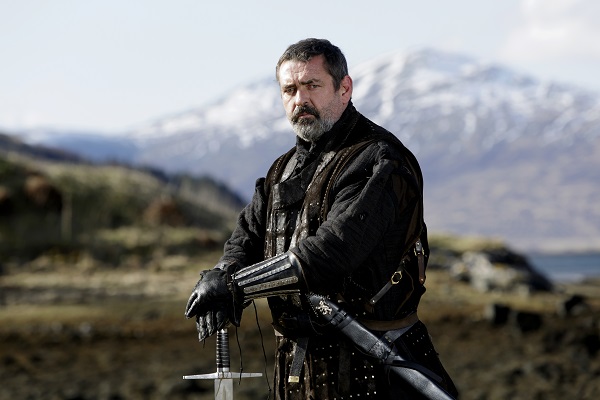As part of Edinburgh International Film Festival 2019.
The announcement of the kinda/sorta sequel to Braveheart came out of the blue a few weeks before EIFF. With Angus Macfadyen reprising his role as the legendary Scottish king, the story resumes in the interregnum between the death of William Wallace and the First War of Scottish Independence. It has however, been beaten to the punch by David Mackenzie‘s Outlaw King in one of those cinematic coincidences where similar projects appear around the same time. However, with Mackenzie’s film having sunk beneath the waves public conscience after an initially flurry of interest, the way was clear for Robert the Bruce to play Armageddon to Outlaw King‘s Deep Impact and leave its own kingly crater. It is however another disappointment: undone by an overwrought portentous tone and an almost comical sense of earnestness.
In 1306 a tired and disillusioned Robert is attacked by former comrades in arms tempted by the bounty of 50 gold pieces placed on his head by the ailing Edward I. Critically injured, he’s discovered by the family of tender crofter Morag (Anna Hutchison), who nurses him back to health. Despite the misgivings of her son Scott (Gabriel Bateman) whose father died fighting for Robert’s cause. The beleaguered Robert is nursed back to both his health and his ideals, but before picking up the banner again, he must deal with those seeking to claim the tempting bounty.
Robert the Bruce is a strange film. Like its hero, who frets about his legacy in relation to the martyred William Wallace, it’s surely doomed to be dwarfed by the shadow of an illustrious predecessor. Despite the virtues of Braveheart being entirely debatable, it was still a pivotal moment for the representation of Scotland on film. It’s difficult to see how its successor could possible succeed as an enterprise. Filmed in the US for budgetary reasons, it has a fraction of the resources Mel Gibson had at his disposal, but with the wavering accents on display due to the proliferation of American actors, it also feels like it suffers the same problems of authenticity.
Director Richard Gray does make the most of the available means. The spare scenes of action are well-shot and unflinching in their brutality as those staged by the famously blood-thirsty Gibson. Their brevity and small-scale are actually virtues here, as they tie in with the themes of isolation. Robert is jaded, battle-weary and virtually alone. These are grim, desperate scraps for survival. It’s also nice to see Jared Harris, still glowing from Chernobyl, popping in a nice villainous cameo.
It is the more frequent moments of stillness and reflection that are the problem. The lumpy script is clogged with endless ruminations about regret, duty and honour. The narrative of a tortured hero haunted by loss and plagued by doubt is a strained one, and as played by Macfadyen Bruce is all pained grimaces and speeches that come across as thinly-veiled polemics about independence. It would of course be odd if the Bruce began to espouse the benefits of Unionism, but it’s usually best to keep subtext as just that rather than engage in the overt flag-waving usually reserved for Hollywood.
The biggest issue Robert the Bruce has is that it tries to tap into Braveheart‘s old-fashioned sense of the epic. Right from the off, with its rolling hills and soundtrack of swollen flutes and skirling pipes, it’s at risk of veering into parody. Outlander may have brought in tourism, but it’s almost a trashy pastiche of the aesthetic that Robert the Bruce insists on utilising. It would have been wiser to make a lean, stripped-down and gritty tale of survival that made its low budget a strength. You can’t fault Macfadyen and Gray’s sense of ambition, but you can certainly fault the end product.
World Premiere screenings at Vue Omni Centre Sun 23 and Tue 25 Jun 2019
